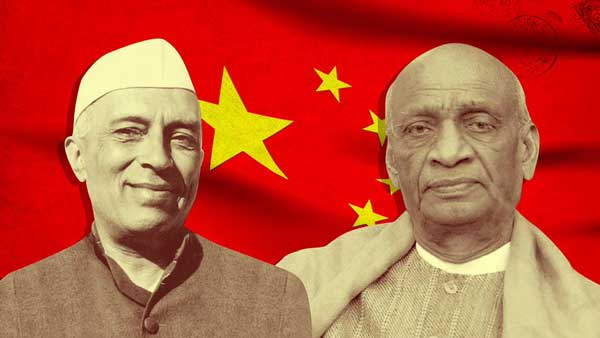Sardar Patel’s forecasting words about China that Nehru ignored & India faced shameful loss in the 62 War

New Delhi : On 31 October, the birthday of India’s Iron Man Sardar Vallabhbhai Patel is celebrated with great enthusiasm across the country as ‘National Unity Day’. It was Sardar Patel who played an important role in India’s struggle for independence and later took on the responsibility of unification of the country. Not only this, Sardar Patel also saved India from becoming an Islamic state. He adopted the policy of ‘sam, daam, dand, bhed’ to integrate more than 560 princely states. Through his strategic and diplomatic skills he integrated difficult princely states like Jodhpur, Junagadh, and Hyderabad. Nevertheless, Sardar Patel could not cross a barrier in his illustrious diplomatic record and it was not due to his fault, but because of the inability of the then Prime Minister Pandit Jawaharlal Nehru.
Nehru practically let Tibet into China’s hands easily. This was one of Nehru’s biggest mistakes that continues to be a canker. In fact, in his last years, Sardar Patel’s differences with Jawaharlal Nehru began to emerge. These differences were about the decisions being taken by Nehru, which the entire country still has to bear. The biggest issue was the Chinese invasion of Tibet.
Sardar Patel was a visionary and had a foresight of China’s rising footsteps. He knew that if today China invaded Tibet and merged with its border, then it can attack India too. The same thing happened. In October 1950, China’s Liberation Army invaded Tibet. China’s autocratic leader Mao had made full arrangements to attack Tibet and merge with it in China. On this, Sardar Patel wrote a letter to Jawaharlal Nehru on 7 November and warned him to immediately fix his border issue and take tough decisions against China.
He wrote in his letter – “Tibet was a friend of India, so we never had a problem. We have always respected his autonomy by having an independent treaty with Tibet. People with obscure border states of the north-eastern border and people who are fond of China in our country can cause problems anytime.”
He further writes about China’s invasive policy, “China’s vision is not limited to our Himalayan regions. It is also eyeing some important parts of Assam. It also has an eye on Burma. There is an even greater problem with Burma, as there is no line defining its boundary, on the basis of which it can reach an agreement. The tribal areas of Nepal, Bhutan, Sikkim, Darjeeling and Assam come to our north-eastern regions’.
He further wrote, ‘China’s final move is the same as treachery and betrayal. The Tibetans believe in us. We have also been guiding them and now we are unable to save them from the trap of Chinese diplomacy or Chinese maliciousness. This is a sad thing. From the information received, it seems that we will not be able to remove the Dalai Lama either.
He wrote a letter to Bajpai after attempting to draw Nehru’s attention to the Tibetan issue. He wrote, “The Chinese advance in Tibet raises the concerns of all our security equations. I completely agree with you that rethinking our military situation and our forces is inevitable.”
Sardar Patel did not agree with the idea of friendship with China and ‘Hindi-Chini Bhai-Bhai’ but Nehruji was misled by this ‘Hindi-Chini Bhai-Bhai’ idea. He began to believe that if India retreated to the Tibet issue, then lasting friendship relations would be established between China and India, but the reality was something that Nehru could not understand. The then Secretary General of the Ministry of External Affairs, Mr. Girijashankar Vajpayee also agreed with Sardar Patel’s views. He was also not in favor of supporting China’s claim in the United Nations, which was another major mistake of Nehru.
Sardar Patel feared that India’s leftist and Marxist party would have access to communists outside the country, especially to China. There will also be supply of arms and literature etc. to the leftists from other communist countries. He wanted the government to formulate a clear policy about the Communist Party of India and China. It is clear from these thoughts that Sardar Patel already had a clue about China’s thinking and its misdeeds. His prediction came true and China first occupied Tibet and then attacked India. Knowing that China had already entered Tibet in November 1950, Nehru announced during a debate in Parliament that he had instructed the Ministry of Defense to reduce defense spending and the size of the military. As a result, in the year 1951, 50000 army soldiers were removed.
The effect of this mentality for Nehru’s army was visible during the war of 1962, when our armed forces fought against an organized Chinese army without coordination and India suffered defeat. Not only this, China also illegally controlled the Aksai in Ladakh region. If Jawaharlal Nehru had obeyed Sardar Patel, then perhaps the war of 1962 would not have happened and neither could China have looked at India.










